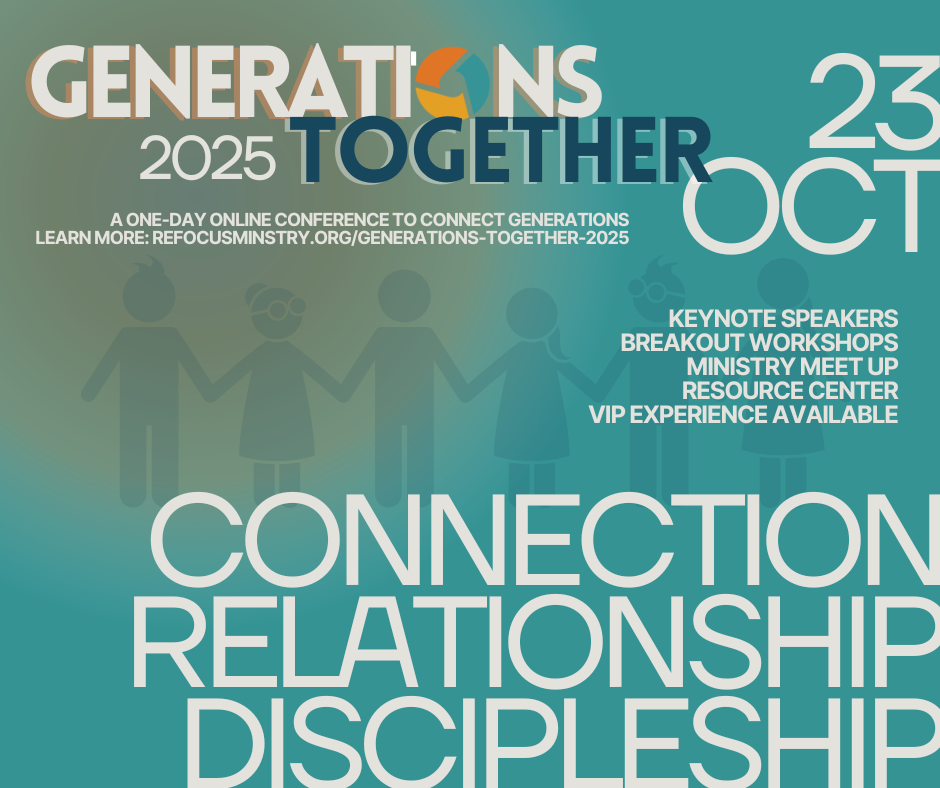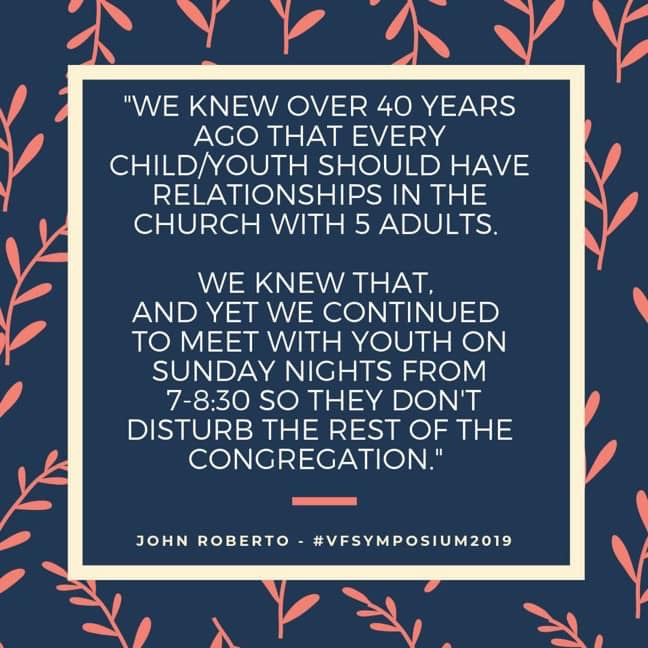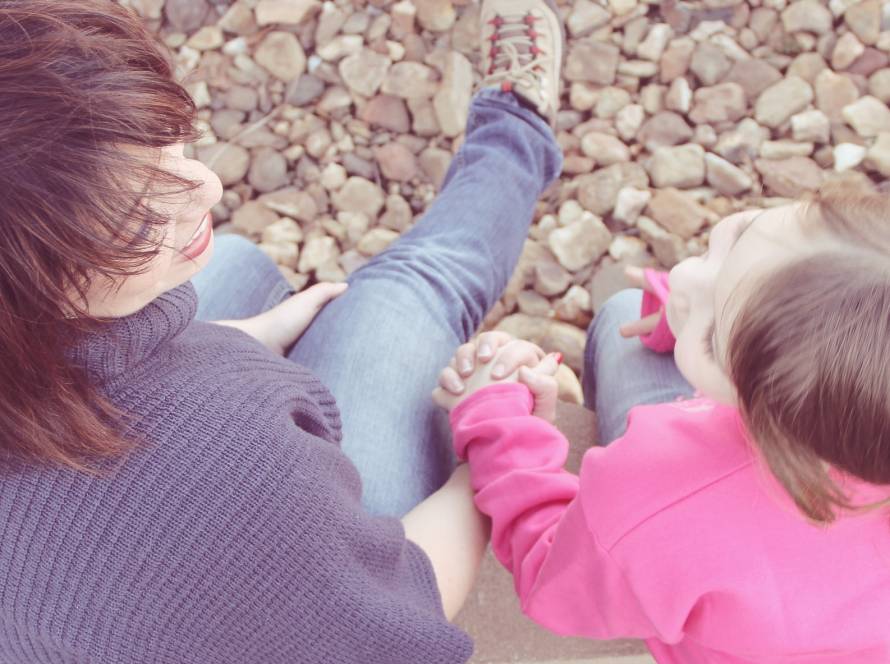Over the years, I’ve had the chance to be a part of many conversations about intergenerational worship and generational discipleship. Most conversations inevitably end up in a series of questions that usually start with “What if…”
For example, if we talk about including children in the corporate worship time the “What if’s” include…
- What if the kids talk or “whisper loudly”?
- What if they cry or whine or whimper or wail?
- What if they are bored?
- What if they wiggle, squirm, move around, have to pee, get up and walk around?
- What if they are distracting to the adults, to their parents, to the older generation?
Or if we talk about holding an event that is open to all generations, the “What if’s” are more like this:
- What if the generations don’t talk to each other or can’t relate to each other?
- What if the time, place, topic, etc. doesn’t work for this group or that group?
And if we talk about including the children and youth in serving within the church community, the “What if’s” are more along the lines of…
- What if they don’t show up or work hard?
- What if they are irresponsible or do things incorrectly?
- What if there are not enough adults to volunteer to supervise them so they just get in the way?
- What if someone gets upset because they want it done a certain way or they think it’s their role in the church?
So, okay, let’s talk about it.
What if all the “What if’s” happened?
Would it wreck the church? Would there be irreversible damage? Would there be no recourse but to just say, “It’s over. Throw in the towel. Intergenerational ministry just doesn’t work?”
Are the risks really so great that if all of the greatest fears happened, if all of the “What if’s” came true, it’d be too much to even try?
Even if we know, because of research and studies, both secular and religious, that the results of intergenerational ministry and relationships include things like reduced “dropout” of young people once they graduate of high school, increased spiritual growth for the entire church, a mature faith in young adults, a sense of belonging and meaning for children, and a stronger community of faith across the board.
What if ALL the “What if’s” happened BUT so did all the other things?
Young people remained in the faith and in the church after they graduate high school as opposed to the current trend of rapid decline in both.
The entire church experienced overall spiritual growth and vibrancy in the congregational community was heightened (or as the researchers at Fuller Youth Institute put it, “Warm intergenerational relationships grow everyone young.”)
College students had a mature and well-developed faith that was able to carry them through their college years and into healthy marriages and parenting roles.
Children recognized themselves as part of the larger faith community, not separate or somehow lesser than, but genuinely a needed and necessary piece of the church as a whole.
The church grew stronger together, sharing not only a building during a certain period of time each week, but worship and relationship and creativity and fellowship that even carried over to life outside the walls.
Would it be worth it then… to hear some cries, to watch some wigglers, to have to hear music we didn’t necessarily like or see something done differently than it was before? Would it be worth some distraction, an interruption, some inconvenience or some sacrifice?
What if all the “What if’s” happened…and we decided beforehand that it was okay because it was, most certainly, worth it.
Because, my experience has been, and other attest, that all of these “What if’s” don’t usually happen and certainly don’t usually happen all at once. And there are ways to help make sure that if they do, there are tools and structures and support in place to ensure that they don’t cause irreparable damage.
And in the end, is really a risk… or just a stretch?
Just a willingness to be a little uncomfortable in order to grow, to learn, to experience something that may seem new to us, but is actually the way things were for centuries; the way our faith was passed to us – from one generation to another (Ps. 145:4).
What if…
Generations Together is a one-day online conference designed to inspire and equip church leaders, volunteers, and ministry teams to build bridges across generations.

Hosted by Dr. Christina Embree of ReFocus Ministry, this interactive experience features:
- Dynamic Keynote Sessions with thought leaders in intergenerational discipleship
- Breakout Workshops led by practitioners who’ve seen transformation in real congregations
- Ministry Meetups where you’ll connect directly with speakers and other attendees in live chat spaces
- VIP Access to all session recordings, exclusive digital resources, and Q&A panel with leading voices
Whether you’re new to intergenerational ministry or looking to deepen what you’re already doing, this conference will give you practical tools, inspiring stories, and meaningful connections to help your whole church grow—together. LEARN MORE
🎟 Early Bird: $15 (8/1/2025)| Regular: $30 (9/1/2025)
🌟 VIP: $50 (includes exclusive panel discussion + digital resource packet + all session recordings)
About the Author

Christina Embree is the founder and director of ReFocus Ministry. She holds a masters in ministry focused on Children, Youth, and Family Ministry and a doctorate in spiritual formation with a focus on age segregation and intergenerational ministry. In addition to coaching churches of multiple denominations and traditions all around the globe, Christina serves as the Minister of Generational Discipleship for the Great Lakes Conference of the Brethren in Christ and as a pastor at Plowshares Brethren in Christ in Lexington, Kentucky. She is widely recognized as a speaker and author in the areas of generational discipleship, intergenerational ministry, and family ministry. As the mother of three children, she is familiar with the challenges of faith at home and pastoral ministry. She along with her husband Luke share a love for the church, their community, and the global work of peace and restoration through Jesus.


